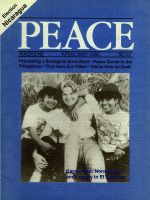
Peace Magazine Apr-May 1990, page 30. Some rights reserved.
Search for other articles by Val Klassen here
By Kevin Jardine
FIVE Peace Activists climbed over a fence at a North Dakota nuclear missile launch site near the Manitoba border on January 7 and occupied the site for three hours. They fastened a banner on the weapon's underground silo, poured their own blood on it, and sprinkled bird seed, representing their hope that a site of death will be transformed into a site of life.
Turned over to police were Americans Dan Schechter, Mark Rogness, Barb Katt, and John Laforge; and Winnipeg's Jason Longhhead.
The demonstrators drew public attention to the 1,000 nuclear ballistic missiles in the Midwest, most within a short distance of the Canadian border.
The state of North Dakota dropped the charges the day before the trial date. Officials concluded that "this would ...just give these people what they wanted: a platform for their views.
THE U.S. AIR FORCE plans to place 50 mobile MX missiles on trains garrisoned at six bases, including near Grand Forks, North Dakota: Spokane, Washington; and Oscoda, Michigan. During international crises, the trains will be sent out on commercial railway tracks, where they can cross the Canadian border.
Each train will carry 20 warheads-totalling up to twice as powerful as all the weapons used during World War II. Mx missiles can be launched from the trains. All this depends on whether Congress approves $5.6 billion for modernization of weapons. It may decide on MX funding in April.
We ask that Canada be included in the environmental impact hearings-including the environmental impact of a nuclear strike on North Dakota.
According to David Kraft, the disarmament coordinator for Greenpeace Canada, the new weapons will not be covered by the "Strategic Arms Reduction Talks."
Since the Soviet Union cannot precisely target the Mx trains, they will target the railway tracks a few hours north and south of the Air Force bases. This makes Canadian border towns nuclear targets for the first time. Nothing short of tearing up the tracks or cancelling the Mx program will assure the Soviets that these trains will not cross into Canada.
The most likely cause of a nuclear war is an accident caused by the complexity of nuclear weapons. This threat continues to grow. For the first time we have a chance to expose the greed and military self-interest that is the real cause of the nuclear arms race.
The Mayor and Chamber of Commerce of Grand Forks lobbied the U.S. Air Force. For a few short term jobs, they helped place the whole world at risk. Still, funds for the Mx may not be approved by Congress. Our Amer-ican activist friends need our help in working to prevent the modernization of these weapons.
Val Klassen, Correspondent Winnipeg (WCCD)

Peace Magazine Apr-May 1990, page 30. Some rights reserved.
Search for other articles by Val Klassen here